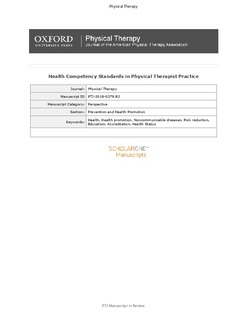| dc.description.abstract | Although the physical therapist profession is the leading established, largely nonpharmacological health profession in the world and is committed to health promotion and noncommunicable disease (NCD) prevention, these have yet to be designated as core physical therapist competencies. Based on findings of 3 Physical Therapy Summits on Global Health, addressing NCDs (heart disease, cancer, hypertension, stroke, diabetes, obesity, and chronic lung disease) has been declared an urgent professional priority. The Third Summit established the status of health competencies in physical therapist practice across the 5 World Confederation for Physical Therapy (WCPT) regions with a view to establish health competency standards, this article's focus. Three general principles related to health-focused practice emerged, along with 3 recommendations for its inclusion. Participants acknowledged that specific competencies are needed to ensure that health promotion and NCD prevention are practiced consistently by physical therapists within and across WCPT regions (ie, effective counseling for smoking cessation, basic nutrition, weight control, and reduced sitting and increased activity/exercise in patients and clients, irrespective of their presenting complaints/diagnoses). Minimum accreditable health competency standards within the profession, including use of the WCPT-supported Health Improvement Card, were recommended for inclusion into practice, entry-to-practice education, and research. Such standards are highly consistent with the mission of the WCPT and the World Health Organization. The physical therapist profession needs to assume a leadership role vis-à-vis eliminating the gap between what we know unequivocally about the causes of and contributors to NCDs and the long-term benefits of effective, sustained, nonpharmacological lifestyle behavior change, which no drug nor many surgical procedures have been reported to match. | nb_NO |
